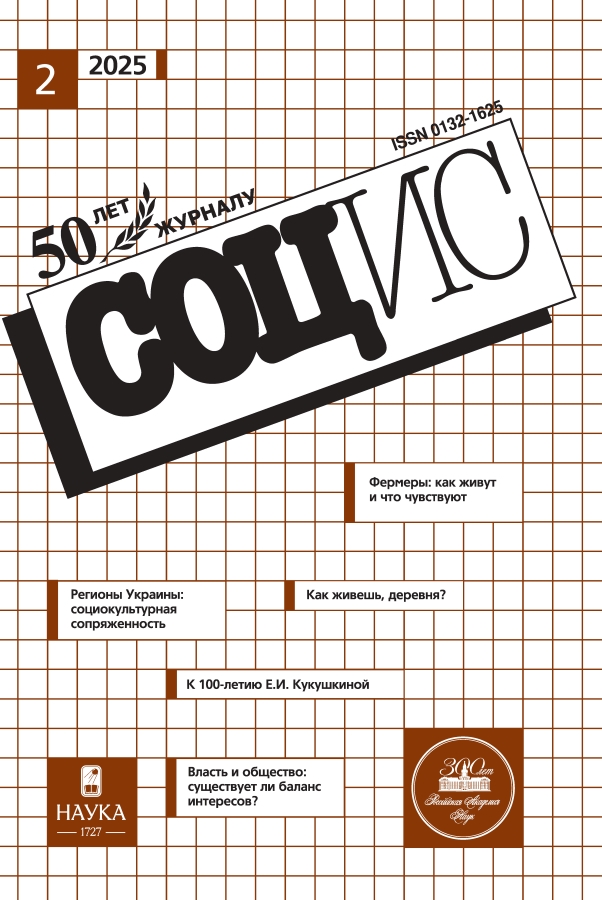Russian social thought and ontological horizons of modern sociological theory
- Authors: Shmerlina I.A.1
-
Affiliations:
- Institute of Sociology of FCTAS RAS
- Issue: No 2 (2025)
- Pages: 15-24
- Section: НОВЫЕ ИДЕИ И ЯВЛЕНИЯ В СОЦИОЛОГИИ И СОЦИАЛЬНОЙ ПРАКТИКЕ
- URL: https://ruspoj.com/0132-1625/article/view/682080
- DOI: https://doi.org/10.31857/S0132162525020022
- ID: 682080
Cite item
Abstract
The article contains a case of theoretical-methodological and historical-sociological reflection on socio-ontological issues. Present in sociology mainly in the form of background assumptions, this problematic has recently become a subject of active discussion. A number of researchers characterize this situation as an “ontological turn”, which is assessed in the article as an excessive metaphor. Manifested in the form of a “flat ontology”, the so-called “ontological turn” indicates not so much a methodological concern for the philosophical foundations of sociological research, as a desire to neutralize the extremes of social constructivism, while avoiding the final solution of the “damned” ontological issues. It is shown in the article that the “ontological turn” in Bruno Latour’s version of “flat ontology” is a demonstrative refusal to discuss ontological issues and its reduction to the methodology of research work. The lack of ontological clarity regarding the entities under study generates a research situation in which social ontology is reduced to the subject of research, “second-order constructs” are merged with the respondent’s direct judgments, and the ontology of the social whole is replaced by the ontology of the subject. Believing that social ontology is related to two fundamental questions – what does the social “consist of” and at what level does it exist, the author turns to the sociology of P. Sorokin and social philosophy of S. L. Frank. The works of the former help to substantiate the idea of the semiotic nature of social reality, while the works of the latter help to understand that the nature of social relations is fully comprehensible at the level of a social systemic whole. Frank’s holistic approach, productive as a methodological alternative to “flat” ontology, is explicated in the article from three perspectives – religious, phenomenological and systemic.
Full Text
About the authors
Irina A. Shmerlina
Institute of Sociology of FCTAS RAS
Author for correspondence.
Email: shmerlina@yandex.ru
Dr. Sci. (Sociol.), Leading Researcher
Russian Federation, MoscowReferences
- Bhaskar R. (2008) A Realist Theory of Science. G.B.: Verso Books.
- Burbulis Yu.V. (2019) Renewal of onthology: Sociality of Being. Izvestiya UrFU. Ser. 3. Obshchestvennyye nauki [Herald of UrFU. Ser, 3. Social sciences]. Vol. 14. No. 3: 18–28. (In Russ.)
- DeLanda M. (2018) New philosophy of society: Theory of assemblages and social complexity. Perm: Gile Press (In Russ.)
- Durkheim E. (1991) Method of sociology. In: On the division of social labor. Method of sociology. Moscow: Nauka: 391–532. (In Russ.)
- Efroimson V. P. (1971) Pedigree of altruism. Novyy mir [New world]. No. 10. URL: http://vivovoco.astronet.ru/VV/PAPERS/ECCE/VV_EH12W.HTM (accessed 20.10.2014). (In Russ.)
- Frank S. L. (1992) Spiritual foundations of society. Introduction to social philosophy. In: Spiritual foundations of society. Moscow: Respublika: 13–146. (In Russ.)
- Goffman A. B. (2005) Does society exist? (From psychological reductionism to epiphenomenalism in the interpretation of social reality). Sotsiologicheskiye issledovanya [Sociological Studies]. No. 1: 18–25. (In Russ.)
- Kerimov T. (2022) “Ontological turn” in the social sciences: the return of epistemology. Sotsiologicheskoye obozreniye [Russian Sociological Review]. Vol. 21. No. 1: 109–130. doi: 10.17323/1728-192x-2022-1-109-130. (In Russ.)
- Kreidlin G. E. (2002) Nonverbal semiotics: Body language and natural language. Moscow: NLO. (In Russ.)
- Latur B. (2014) Reassembling the social: An introduction to actor-network-theory. Moscow: VSHE. (In Russ.)
- Latur B. (2017a) On Actor-Network Theory. A few clarifications, plus more than a few complications. Logos [Logos]. Vol. 27. No. 1: 173–200. (In Russ.)
- Latur B. (2017b) On Recalling ANT. Logos [Logos]. Vol. 27. No. 1: 201–216. (In Russ.)
- Luhman N. (2004) Society as a social system. Moscow: Logos. (In Russ.)
- Napreenko I. (2013) Semiotic turn in STS: the theory of the referent by Bruno Latour. Sotsiologiya vlasti [Sociology of Power]. No. 1–2: 75–98. (In Russ.)
- Modern social ontology in the mirror of the Russian ontological tradition: discourses and interpretations. (2024) Korolev: Kosmos. (In Russ.)
- Shirokov A. (2019) The politics of explanation and the strategy of description of Bruno Latour: how to write infrareferential texts. Sotsiologicheskoye obozreniye [Russian Sociological Review]. Vol. 18. No. 1: 186–217. (In Russ.)
- Shmerlina I. A. (2006) Semiotic concept of sociality: problem statement. Sotsiologicheskiy zhurnal [Russian Sociological Journal]. No. 3/4: 45–25. (In Russ.)
- Shmerlina I. A. (2022a) Sociology of Social Forms: Reassembling the Theory. Moscow: FNISTS RAN. (In Russ.)
- Shmerlina I. A. (2022b) Conceptual perspectives on the notion of intersubjectivity. Zhurnal sotsiologii i sotsialnoy antropologii [The Journal of Sociology and Social Anthropology]. No. 3: 7–40. doi: 10.31119/jssa.2022.25.3.1. (In Russ.)
- Sorokin P. A. (1920) The System of Sociology. Vol. 1. Petrograd: Izd. t-vo “KOLOS”. (In Russ.)
- Brassier R. (2017) Concepts and objects. Logos [Logos]. No. 3: 227–262. (In Russ.)
Supplementary files










